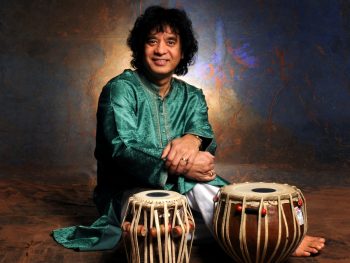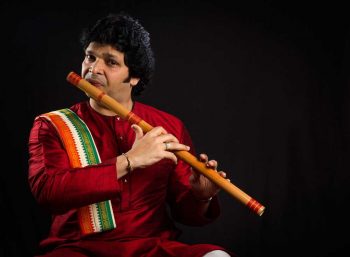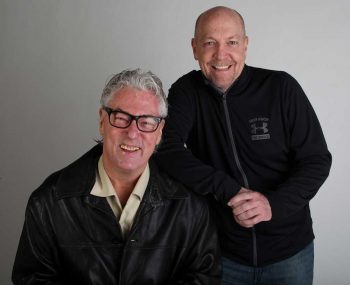By Denny Dyroff, Entertainment Editor, The Times
On March 24, area music fans will have the opportunity to hear one of the legendary masters of Indian classical music perform live in concert with one of India’s emerging new luminaries.
Zakir Hussain, a master percussionist in North Indian Hindustani classical music, is recognized as the world’s premier table player. He will perform on stage in a duet with Rakesh Chaurasia — one of the top flutists from the Indian sub-continent – in a show at Independence School (1300 Paper Mill Road, Newark, Delaware, www.badv.us/mosaic).
Hussain is today appreciated both in the field of percussion and in the
music world at large as an international phenomenon. A classical tabla
virtuoso of the highest order, his consistently brilliant and exciting
performances have not only established him as a national treasure in
his own country, India, but gained him worldwide fame.
His playing is marked by uncanny intuition and masterful improvisational
dexterity, founded in formidable knowledge and study. The favorite
accompanist for many of India’s greatest classical musicians and
dancers, he has not let his genius rest there.
Widely considered chief architect of the contemporary world music movement, Hussain’s contribution to world music has been unique, with many historic collaborations, including Shakti, which he founded with John McLaughlin and L. Shankar, Remember Shakti, the Diga Rhythm Band, Making Music, Planet Drum with Mickey Hart, Tabla Beat Science, Sangam with Charles Lloyd and Eric Harland.
He is also known for his recordings and performances with artists as diverse as George Harrison, YoYo Ma, Joe Henderson, Van Morrison, Airto Moreira, Pharoah Sanders, Billy Cobham, Mark Morris, Rennie Harris, and the Kodo drummers.
Hussain’s prowess as a table player came naturally – even genetically. His father Alla Rakha. Ustad Allarakha Qureshi, popularly known as Alla Rakha, was an Indian tabla player specialized in Hindustani Classical music. He was a frequent accompanist of the world’s greatest proponent of Indian classical music — sitarist Ravi Shankar.
Hussain was a child prodigy.
His father taught him Pakhawaj from the age of 3 years. Alla Rakha belonged to the tradition of tabla-playing known as the Punjab baaj, one of the six main traditions (baaj) of north Indian tabla drumming, the others being Delhi, Benares, Ajrara, Farrukhabad, and Lucknow.
Hussain was touring by the age of 11. He went to the United States in 1969 to do his PhD at the University of Washington, receiving a doctorate in music. After that he began his international career, including more than 150 concert dates a year.
“For the first 15 years of my life, it was only Indian music,” said Hussain, during a recent phone interview. “When I got to America, I was exposed to jazz and gamelan. I spent another eight years trying to get used to that.
“Now, with younger Indian musicians, they grow up with exposure to music of the world. They are learning all the music and it appears to them as one entity. They know 50 times more about music of the globe than I did when I was 25.”
One of those younger musicians is Rakesh Chaurasia, who is a shining light in the next generation of Indian classical musicians.
Rakesh Chaurasia, the nephew and child prodigy of flute maestro Pandit Hariprasad Chaurasia, has a famous name to live up to. Among the promising musicians of the second generation, Chaurasia has carved a niche for himself as an accomplished flautist.
From a young age, Hussain has been accompanying all the leading lights of Hindustani classical music, including Pandit Ravi Shankar, Ustad Vilayat Khan, Ustad Ali Akbar Khan, Pandit Shiv Kumar Sharma, Pandit VG Jog, Pandit Bhimsen Joshi, Pandit Jasraj – and Pandit Hariprasad Chaurasia.
“I played with Rakesh’s uncle Pandit Hariprasad Chaurasia a whole lot,” said Hussain. “Rakesh is his nephew, his student and his heir apparent. I’ve been playing with Rakesh for a few years.
“For a while now, I’ve been bringing young Indian musical geniuses to various parts of the world. Rakesh is one of these. He’s the next great flutist of India.
“Having played with his uncle for 35 years, I’m familiar with his musicality. We can sit on a stage and find a common element. That’s where our coming together becomes more seamless.”
Incorporating the tradition of his renowned uncle and infusing his personal style, Chaurasia has evolved a style which while maintaining the purity of the flute manages to capture the attention of the young listeners too. At the same time, he shows all the promise to carry the Chaurasia legacy to new heights.
Chaurasia’s flute has matched note and rhythm with wind instruments of other cultures as well as having performed “jugalbandis” with Carnatic and world-famous instrumentalists. His forte is in blending his flute without really losing its identity in mixed instruments’ concerts.
His most recent venture is his fusion band Rakesh and Friends (RAF) which creates music that appeals to the young without sacrificing the essence of classical music. Despite his experimental work, Rakesh has never deviated from his main goal of becoming a full-fledged classical musician.
When the two Indian music greats perform together, they incorporate various styles starting with a classical raga.
“When we play together, we do a traditional Indian piece as the opening number,” said Hussain. “Then, we go into Indian folk and light classical music. Rakesh is equally comfortable with Indian classical and folk music – and also jazz.”
The show in Newark is a fund-raising event organized by the Bengali Association of Delaware Valley in support of Cry America.
Video link for Zakir Hussain and Rakesh Chaurasia — https://youtu.be/O2K0ptoYpuc.
The show at the Independence School will start at 6:30 p.m. Ticket prices start at $50.
On March 24, Point Entertainment will present “Two Funny Philly Guys” featuring Big Daddy Graham and Joe Conklin at the Colonial Theatre (Bridge Street, Phoenixville, 610- 917-1228, www.thecolonialtheatre.com).
Big Daddy Graham wanted to be a singer and now he has a career in which he gets to sing onstage — but not as he originally planned.
“I started in entertainment as a drummer in bands,” said Graham, during a nt phone interview from his home in Philadelphia. “I had a job as a paid actor for a few years, but I wanted to be a singer.
“Now, I am doing singing — funny songs. If I’m singing funny songs, it doesn’t need a good singer — it’s to make people laugh. At first, I was singing cabaret with a piano player. Some of the songs were parodies. I built up a following of people who wanted to laugh at me not with me.
“Around that time, comedy clubs were starting to explode. A guy from Comedy Factory Outlet booked me for two shows on Friday nights and two shows on Saturday. I liked that people came in and were quiet. In the clubs I worked before, it was hard to be heard over the crowd noise.
John DiBella started hosting shows on Friday nights. I was doing a song called ‘Nuns.’ Philly being the Catholic town that it is, the song got popular. DiBella said he’d play it on the radio. So, I recorded the song and it was a hit.
“It was the right place at the right time. I became really popular in Philly. That’s where it all started. Now, I do entire shows without any music at all.”
That’s because Graham is a comic who understands how to make Philly laugh. He does it onstage and on the airwaves. He is currently in his 20th year as a host on the sports talk radio station 94WIP, and hosts “Big Daddy Graham’s Classic Rock Throwdown” on Wildfire Radio. As a comic, Graham has appeared on a number of networks including Showtime, A&E and MTV.
“We’ve been working this area for 30 years an we’re still selling tickets,” said Graham. “In as business like this, you’re constantly looking for a way to stay relevant.
“It was about nine years ago when the Borgata put the show together with me and Joe Conklin. They wanted to put me and Joe as headliners.
“Joe and I have been performing individually in this area for about 30 years. For some reason, putting these two names on a bill together makes people want to buy tickets.
“We only do about four shows a year and I’m stunned at the amount of tickets we sell. I am honored that people still come to see us.”
Graham has found a good way to stay relevant.
“I never go onstage without 10 new jokes,” said Graham. “I take an index card out of my pocket and look at the joke — maybe it’s only one word. Some do great and become a permanent part of the show. Some bomb and some get a mixed reception.
“A lot of the jokes are one-liners. For topical jokes, I take something tried-and-true and slip in something new — something topical. Joe does a lot of sports humor so I leave that to him. If I’m working solo, I will do some sports stuff.
“I love working the Colonial. It’s one of my favorites along with the Broadway Theater in Pitman, New Jersey and the Media Theater — three old-school venues that are really fun to play.”
Conklin has been a constant in Philadelphia radio for more than 20 years, with his spot-on impressions of Barack Obama, Bill Clinton, Cole Hamels, Allen Iverson, Charles Barkley, Harry Kalas, Bobby Clarke and many others. Fearless and hilarious, he skewers some of the country’s top politicians, pro athletes, sports executives and film stars.
“Neither Joe nor I are the headliner in this show,” said Graham. “We flip-flop. One time, I’ll go on first and Joe will follow. This year, I’m closing the show. Next year, joe will go on second.”
The show at the Colonial Theatre will begin at 8 p.m. Tickets are $35 (Gold Circle), $30 (Orchestra and Front Balcony) and $25 (Rear Balcony).
Lostboycrow may have mystery surrounding his name but there is nothing mysterious about his music.
He makes sincere music with its roots in R&B and its sensibilities adapted to the present with elements of rock and EDM (electronic dance music)
On March 25, Lostboycrow will perform at the Voltage Lounge (421 North Seventh Street, Philadelphia, 215- 964-9602, www.voltagelounge.com) as part of the “Spin the Globe Part 2 Tour” along with Prelow and Dysn.
Originally from Portland, Oregon, Lostboycrow now calls Los Angeles home.
The singer-songwriter-rocker is somewhat guarded about the origin and meaning of his less-than-ordinary name. It sounds almost like a Native American name, but LBC is just an American kid from an American town in the Pacific Northwest.
“I took my name not long after I moved to L.A.,” said Lostboycrow, during a phone interview Wednesday afternoon during a tour stop in Houston, Texas. “It marked a new beginning.”
Lostboycrow melds R&B, pop, and electronic music into a modern hybrid of relevant soul music. Growing up in the Pacific Northwest, he was into music as well as athletics, and joined the high school choir while listening to pop-punk, screamo, and classic rock.
He brought all of these musical influences together as Lostboycrow after moving to Los Angeles, and released his first track, “Adolescent,” in December 2014. The following year, he issued a string of singles, including “HiyHiy,” “Start Something,” and “Say You Want Me.”
His debut EP, “Sigh for Me,” was released in 2016 followed by the singles “Where Is All Goes,” “Stay a Little Longer,” “Thursday,” and “Verona.”
“I went to L.A. for music,” said Lostboycrow. “There wasn’t much in Portland. I definitely recorded as much as I could in Portland. I was working with other people and they wanted to move. L.A. felt like a real home after three months.”
Lostboycrow’s current recording project is a trilogy of EPs – “Traveler: The First Legend,” “Traveler: The Second Legend,” and the recently-released “Traveler: The Third Legend.”
“The trilogy started after I moved to L.A. a couple years ago,” said Lostboycrow. “I wanted to make an album and have a ton of songs that were connected.
“I wanted to keep the model of releasing singles consistently while still being an artist creating a body of work with depth and cohesiveness.
“With the trilogy, I always intended there to be three from the beginning. The thread is me and the way I write songs. The three legends are filters odf the story of what was going on in my life.”
Lostboycrow’s mellifluous vocals are definitely a major force behind his popularity – bit so is his songwriting.
“With songwriting, I’m always gathering ideas,” said Lostboycrow. “The subconscious is often the best creator. I have a bunch of ideas going constantly.
“My songwriting is different for every song. I like to go in the studio with lyrics and some melodies. After I’ve worked on them, I go off by myself and focus more on the lyrics.”
When asked about his current musical direction, he replied that it was a tough question to answer.
“Right now, I just want to focus on making music that is sincere to who I am,” said Lostboycrow. “I’m more focused on lyrics and melody driving the song. You’re going to start seeing more lyrically-driven songs.
“With the EDM element, I like to have fun and it’s fun making music like that. But, it’s not where my head is at – at least not at the moment. I just recorded a new album in Santa Fe, New Mexico and you’ll see the difference.”
Video link for Lostboycrow – https://youtu.be/ZrLBhfRDWOA.
The “Spin the Globe Part 2 Tour” at the Voltage Lounge will start at 8 p.m. Tickets are $15.










